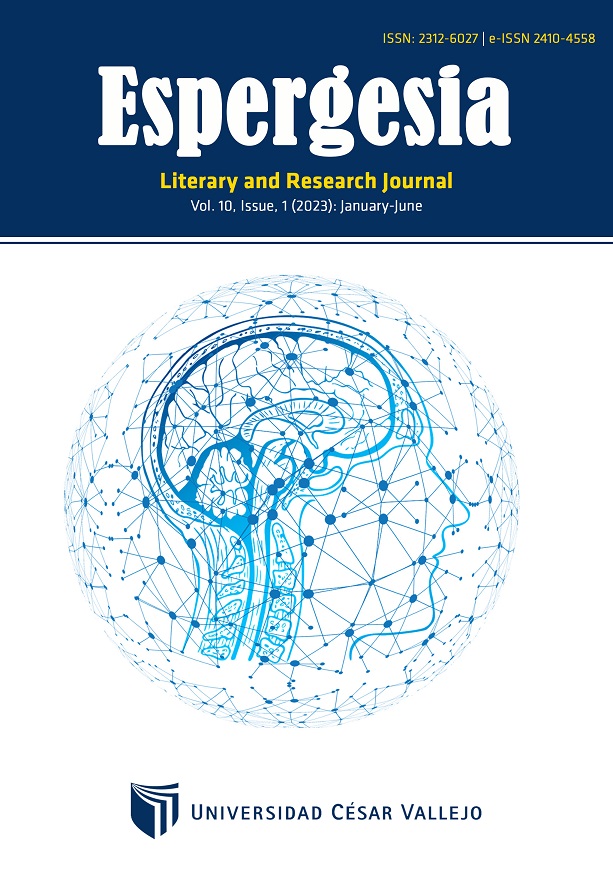An Epistemological Approach to Pedagogical and Andragogical Education in Virtual Environments
DOI:
https://doi.org/10.18050/rev.espergesia.v10i1.2535Abstract
This essay aims to establish a dialogue between the concepts of pedagogy and andragogy, initially delimiting childhood education and adult education, respectively. This dialogue takes place through the ability to incorporate the use of technology in both fields to generate conditions for meaningful learning. However, the essay also highlights how the term pedagogy underpins a much more solid epistemological tradition than andragogy. It is necessary to rethink and update this field of knowledge in order to move towards a new understanding of adult learning that does not have to be dichotomous with pedagogy, but rather integrative. The research-action methodology offers the possibility of continuing to generate educational research and aligns with the field of educational innovation by integrating digital tools to promote educational innovation. Additionally, virtual education offers the possibility of generating an interdisciplinary and transdisciplinary dialogue with educational projects that enable “Lifelong Learning.”
Keywords: Pedagogy; Andragogy; Virtual Education; Research-Action.
References
Abreu-Valdivia, O., Pla-López, R., Naranjo-Toro, M., & Rhea-González, S. (2021). La pedagogía como ciencia: su objeto de estudio, categorías, leyes y principios. Información Tecnológica, 32(3), 131-140. http://dx.doi.org/10.4067/S0718-07642021000300131
Acosta, O., & Genyelbert, E. (2013). Globalización e internacionalización de la educación superior: un enfoque epistemológico. Omnia, 19(1), 75-85. https://www.redalyc.org/pdf/737/73726911002.pdf
Benavides Lara, M. A., Agüero Servín, M., Pompa Masilla, M., & Sánchez Mendiola, M. (2021). El curso en Educación Basada en Evidencias (ebe): reflexiones para la transdisciplina, la docencia y la investigación. Didac (78), 8-19. https://doi.org/10.48102/didac.2021..78_JUL-DIC.73
Bunge, M. (2002). Epistemología. Siglo XXI Editores.
Castillo, F. de J., (2019). Andragogía: una experiencia personal. Cathedra et Scientia. International Journal 5(1) 5-22.
Charoula, A., & Valanides, N. (2009). Epistemological and methodological issues for the conceptualization, development, and assessment of ICT–TPCK: Advances in technological pedagogical content knowledge (TPCK). Computers and Education, 51(1), 154-168. https://www.sciencedirect.com/science/article/abs/pii/S0360131508001085
Da Silva, H. & Colín, M. (2008). La investigación-acción y la formación teórico-crítica del docente de lenguas extranjeras. UNAM-CELE.
Díaz, A., & Camejo, M. (2014). Epistemología y Educación Articulaciones y Convergencias. https://www.colibri.udelar.edu.uy/jspui/handle/20.500.12008/7586
Fernández, M. B., & Johnson M. D. (2015). Investigación-acción en formación de profesores: Desarrollo histórico, supuestos epistemológicos y diversidad metodológica. Psicoperspectivas, 14(3), 93-105. https://dx.doi.org/10.5027/psicoperspectivas-Vol14-Issue3-fulltext-626
Gómez, E. (2015). Diálogos sobre transdisciplina: Los investigadores y su objeto de estudio (Spanish Edition). ITESO. Edición de Kindle.
Hofer, B. K., & Pintrich, P. R. (1997). The development of epistemological theories: Beliefs about knowledge and knowing and their relation to learning. Review of Educational Research, 67(1), 88-140.
Juárez, J. M. & Comboni Salinas, S. (2012). Epistemología del pensamiento complejo. Reencuentro, 65, 38-51. https://www.redalyc.org/pdf/340/34024824006.pdf
Kelly, S. (2005). New Frontiers in the Theorization of ICTMediated Interaction: Exploring the Implications of a Situated Learning Epistemology, ICIS, 41. https://aisel.aisnet.org/cgi/viewcontent.cgi?article=1247&context=icis2005
Latorre Beltrán, A. (2007). Antonio Latorre. La investigación-acción (GRAO - CASTELLANO) (Spanish Edition). Editorial Graó. https://www.amazon.com/-/es/Antonio-Latorre-Beltran-ebook/dp/B01BRRLSH8
Latorre, A. (2005). La investigación-acción. Conocer y cambiar la práctica educativa. Graó.
López, L. (2019). Reflexiones sobre la relación entre pedagogía y ciencias de la educación: anotaciones para una genealogía de la andragogía. 593 Digital Publisher CEIT, 4(2), 31-44. https://dialnet.unirioja.es/descarga/articulo/7144028.pdf
Mora-Bojorque, M., Cabrera-Berrezueta, L. B., Reascos-Vallejo, N. C., & Auccahuallpa-Fernández, R. (2021). Técnicas andragógicas innovadoras para la enseñanza a personas con escolaridad inconclusa: perspectivas desde los docentes. Revista Arbitrada Interdisciplinaria Koinonía, 6(4), 297-315. https://doi.org/10.35381/r.k.v6i4.1503
Morales Inga, S. (2020). ¿Qué es la epistemología y para qué le sirve al científico? Scientia in verba Mag, 6, 187-194. https://philarchive.org/archive/INGQEL
Moreno Mejías, Y. C. (2018). Epistemología y Pedagogía... Consideraciones. Revista Scientific, 3(9), 362-372. https://doi.org/10.29394/Scientific.issn.2542-2987.2018.3.9.20.362-372
Munévar, P. A., Rivera Piragauta, J. A., & Lasso Cárdenas, E. P. (2015). Articulación entre modelos, enfoques y sistemas en educación en la virtualidad. Revista Virtual Universidad Católica del Norte, (46), 21-38. https://revistavirtual.ucn.edu.co/index.php/RevistaUCN/article/view/695
Nicolescu, B. (1996). La transdisciplinariedad. Multiversidad Mundo Real Edgar Morín. A.C.
Paavola, S., & Hakkarainen, K. (2005). The knowledge creation metaphor–An emergent epistemological approach to learning. Science & education, 14, 535-557. https://doi.org/10.1007/s11191-004-5157-0
Perez Lindo, A. (2014). Las TIC, el proceso de conocimiento y las competencias docentes. Avaliação, 19(3), 631-642. https://doi.org/10.1590/S1414-40772014000300006
Pérez, M. J. (2019). La investigación acción en la práctica docente. Un análisis bibliométrico (2003-2017). Magis. Revista Internacional de Investigación en Educación, 12(24), 177-192. https://doi.org/10.11144/Javeriana.m10-20.ncev
Ramírez, J. C. (2015). Fundamentos epistemológicos y manejo de las TIC en la educación. Revista Electrónica TicALS, 1(1). http://als.edu.co/revistaticals/index.php/ticals/article/view/65
Raynal, F., & Rieunier A. (2010). Pedagogía. Diccionario de Conceptos Claves. Editorial Popular.
Rivas, P. (2021). Lifelong Learning. El Aprendizaje Como Forma De Vida. ESIC. https://www.casadellibro.com/libro-lifelong-learning-el-aprendizaje-como-forma-de-vida/9788419480095/13262136
Siemens, G. (2004). Conectivismo: Una teoría de aprendizaje para la era digital. https://skat.ihmc.us/rid=1J134XMRS-1ZNMYT4-13CN/George%20Siemens%20-%20Conectivismo-una%20teor%C3%ADa%20de%20aprendizaje%20para%20la%20era%20digital.pdf
St. Clair, R., & Käpplinger, B. (2021). Alley or autobahn? Assessing 50 years of the andragogical project. Adult Education Quarterly, 71(3), 272-289. https://journals.sagepub.com/doi/pdf/10.1177/07417136211027879
Vélez, D. (2010). La Fundamentación Epistemológica en los Enfoques de Investigación Social. ECOS Desde las fronteras del conocimiento. Revista electrónica, (6), 65-71.
Vélez, D. (2014). Perspectivas epistemológicas para la investigación educativa: aspectos fundamentales, teóricos y metodológicos. Grupo Editorial Éxodo.
Vélez, D., & Mora-Rojas, C. (2023). Fundamentos histórico filosóficos de la Química. Sophia, colección de Filosofía de la Educación, 34, 291-313.
Vélez, D., & Pérez Villafuerte R. (2019). Filosofía y didáctica en la formación de investigadores 1ra ed. Editorial Laripse.
Vidal Ledo, M., & Rivera Michelena, N. (2007). Investigación-acción. Escuela Médica Superior, 21(4). http://scielo.sld.cu/scielo.php?script=sci_arttext&pid=S0864-21412007000400012
Zapata, F. & Rondán, V. (2016). La investigación - acción participativa. Instituto de Montaña. https://pdf.usaid.gov/pdf_docs/pa00n1qh.pdf
Downloads
Published
How to Cite
Issue
Section
License
Copyright (c) 2023 Gilber Chura-Quispe, José Noé Miranda Becerra, Gerardo Raúl Escobar Alvarez

This work is licensed under a Creative Commons Attribution 4.0 International License.







